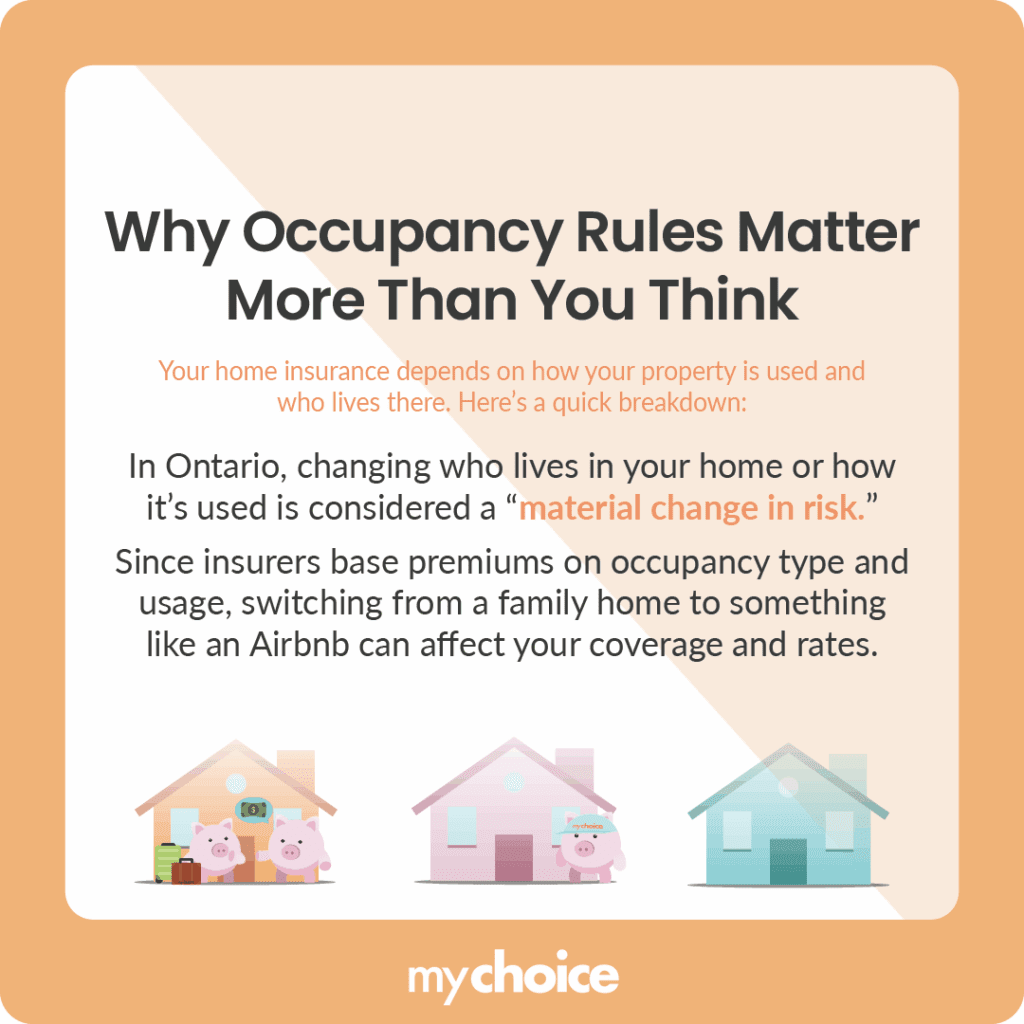A change in occupancy of your residence matters in home insurance. If you don’t notify your insurer about an occupancy change (i.e. turning your personal home into a rental property), the company may void your insurance. Keep reading to learn why occupancy rules matter and how different occupancies affect your home insurance.
Why Occupancy Rules Matter More Than You Think
In Ontario, certain occupancy changes can be considered a “material change in risk.” Insurance companies set home insurance premiums based on their risk calculations, and changes in the number of people and their reasons for living in a property can alter that risk. For instance, the risks of a home used as a family’s permanent residence will differ from those of a home used as a short-term rental, such as an Airbnb.

What Your Occupancy Type Means For Insurance Coverage
Generally, different occupancy types require different kinds of property insurance. For a closer look at what each occupancy type means and what insurance products are required, check the table below:
| Occupancy Type | What It Means | Insurance Adjustments |
|---|---|---|
| Owner-occupied | Second residences are usually vacation homes, which may have long stretches of vacancies between holidays. | Purchase home insurance. |
| Family-occupied /second residence | Second residences are usually vacation homes which may have long stretches of vacancies between holidays. | Look into vacation home or second home insurance. |
| Tenant-occupied | A long-term tenant occupies the property. | Purchase landlord insurance and recommend the renter to get tenant insurance. |
| Short-term rental | Purchase a dedicated short-term rental protection, like home sharing insurance. | Purchase dedicated short-term rental protection, like home sharing insurance. |
| Vacant | Your home is left empty, usually for more than 30 days. | Purchase a vacant property policy or ask your insurer how you can keep the property insured. |
The 30-Day Rule Explained
Canadian property insurance usually applies the 30-day vacancy rule, which means you generally lose your home insurance protection if a property stays vacant for 30 days. This applies whether you’ve moved out, are waiting for your home to sell, your rental property is between tenants, or any other scenario that leaves your home empty for a month.
You can keep your home protected by adding a vacancy permit or purchasing a vacant property policy. Some insurance companies are also willing to provide limited coverage as long as you inspect the property regularly.
Grey Zones That Catch Homeowners Off Guard
The most common grey area you’ll find in homeownership and tenancy is the distinction between tenants and occupants, and by extension, tenancy and occupancy. Here’s a quick summary of what each term means:
- As outlined by Ontario’s Residential Tenancies Act, tenants are people who live in a property with a lease approved by the landlord, assigning them legal and financial responsibilities regarding their stay.
- Occupants live in a property without a lease; therefore, they have no legal or financial responsibilities for their stay.
In some living arrangements, the lines between occupants and tenants can be blurry, especially in terms of rent payments. Let’s say you’re still paying for the home’s mortgage and depend on rent payments. If a tenant doesn’t pay rent, you can seek to leverage their responsibilities to get them to pay rent. However, if an occupant does the same, you don’t have the legal power to get them to pay.
Another thing you may need to pay attention to as a homeowner is the National Occupancy Standard, which outlines how many people a given home can suitably accommodate based on the number of bedrooms.
What to Do Before and After an Occupancy Change
Since insurance companies must be notified about occupancy changes, ensure you notify the insurance company before your property’s occupancy changes. After the new occupants move in, tell your insurance company again to update the policy. If the occupancy change alters the nature of the property’s use, such as turning your residence into a rental property, you may need to change the policy types.
Key Advice from MyChoice
- Inform your home insurance company as soon as you expect an occupancy change on your property.
- Choose the right insurance product based on your occupancy type to get the appropriate protection.
- Consider getting a vacant property policy if you’re leaving your property unoccupied for an extended period.








